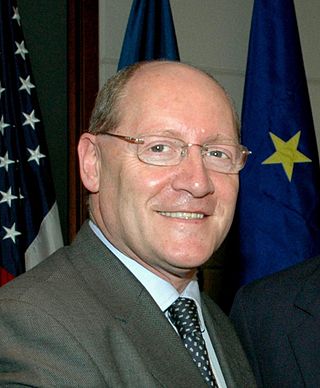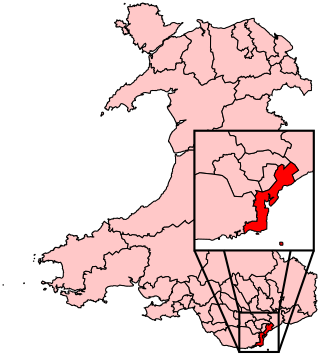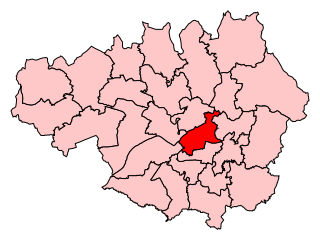Related Research Articles

The UK Independence Party is a Eurosceptic, right-wing populist political party in the United Kingdom. The party reached its greatest level of success in the mid-2010s, when it gained two members of parliament and was the largest party representing the UK in the European Parliament. The party is currently led by Neil Hamilton.

The 2004 European Parliament election was the United Kingdom's part of the wider 2004 European Parliament election which was held between 10 and 13 June 2004 in the 25 member states of the European Union. The United Kingdom's part of this election was held on Thursday 10 June 2004. The election also coincided with the 2004 local elections and the London Assembly and mayoral elections. In total, 78 Members of the European Parliament were elected from the United Kingdom using proportional representation.

Cardiff South and Penarth is a constituency created in 1983 represented in the House of Commons of the UK Parliament since 2012 by Stephen Doughty, a Labour Co-op MP. It is the largest such entity in Wales, with an electorate of 75,175 and one of the most ethnically diverse.

Manchester Central is a parliamentary constituency in Greater Manchester created in 1974 represented in the House of Commons of the UK Parliament since 2012 by Lucy Powell of the Labour Party and Co-operative Party.

Derby North is a constituency formed of part of the city of Derby, represented in the House of Commons of the UK Parliament since 2019 by Amanda Solloway, a Conservative.

Hornsey and Wood Green is a constituency in Greater London created in 1983 and represented in the House of Commons of the UK Parliament since 2015 by Catherine West, of the Labour Party. To date it has drawn together for general elections parts of the London Borough of Haringey.

Harrow West is a constituency in Greater London created in 1945 and represented in the House of Commons of the UK Parliament. Until 1997, it only returned Conservative MPs; since then, it has elected the Labour Co-operative MP Gareth Thomas on a fluctuating majority. Since 2010, this has been bolstered by the loss of Pinner from the seat and the gain of a favourable ward for Labour from Harrow East.

Thurrock is a constituency represented in the House of Commons of the UK Parliament since 2010 by Jackie Doyle-Price, a Conservative.

Euroscepticism in the United Kingdom is a continuum of belief ranging from the opposition to certain political policies of the European Union to the complete opposition to the United Kingdom’s membership of the European Union. It has been a significant element in the politics of the United Kingdom (UK). A 2009 Eurobarometer survey of EU citizens showed support for membership of the EU was lowest in the United Kingdom, alongside Latvia and Hungary.

Rochester and Strood is a constituency in Kent represented in the House of Commons of the UK Parliament since 2015 by Kelly Tolhurst, a Conservative. Since 2022, she has served as Government Deputy Chief Whip and Treasurer of the Household.

The 2009 European Parliament election was the United Kingdom's component of the 2009 European Parliament election, the voting for which was held on Thursday 4 June 2009. The election was held concurrently with the 2009 local elections in England. In total, 72 Members of the European Parliament were elected from the United Kingdom using proportional representation.

Jonathan William Arnott is a British politician and former schoolteacher. After the 2014 European Parliament election, he served as a Member of the European Parliament (MEP) for the North East England region. Originally sitting as a UK Independence Party (UKIP) representative, he resigned from the party on 19 January 2018 to sit as an independent until designating as Brexit Party on 17 April 2019.

The 2014 European Parliament election was the United Kingdom's component of the 2014 European Parliament election, held on Thursday 22 May 2014, coinciding with the 2014 local elections in England and Northern Ireland. In total, 73 Members of the European Parliament were elected from the United Kingdom using proportional representation. England, Scotland and Wales use a closed-list party list system of PR, while Northern Ireland used the single transferable vote (STV).

The Norfolk County Council election took place across Norfolk on 2 May 2013, coinciding with local elections for all county councils in England. The results were announced the following day, Friday 3 May 2013. The result brought to an end 12 years of Conservative administration, who finished three seats short of a majority after losing 20 seats, leaving the Council in no overall control (NOC). UKIP and the Labour Party both made gains of 14 and 11 seats respectively. The Liberal Democrats and the Green Party both lost three seats each, whilst an independent won a single seat in North Norfolk.

Independence from Europe was a minor, Eurosceptic political party in the United Kingdom. The party was first registered in June 2012 but remained inactive until it was launched in October 2013 by sole party leader Mike Nattrass, a disaffected member of the UK Independence Party (UKIP). It had no official political representation at the time of its dissolution in November 2017, but previously had one Member of the European Parliament (MEP) and three Councillors, all of whom were once members of UKIP.

The 2015 United Kingdom general election was held on Thursday 7 May 2015 to elect 650 Members of Parliament to the House of Commons. It was the only general election held under the rules of the Fixed-term Parliaments Act 2011 and was the last general election to be held before the United Kingdom would vote to end its membership to the European Union (EU). Local elections took place in most areas of England on the same day.

Elections of police and crime commissioners in England and Wales were held on 5 May 2016.

A by-election was held in the UK Parliament constituency of Brecon and Radnorshire on 1 August 2019 after Chris Davies, who had held the seat for the Conservatives since the 2015 general election, was unseated by a recall petition. The by-election was won by Jane Dodds of the Liberal Democrats.

The red wall is a term used in British politics to describe the UK Parliament constituencies in the Midlands and Northern England that historically supported the Labour Party. At the 2019 United Kingdom general election, many of these parliamentary seats were won by the Conservative Party, with the media describing the red wall as having "turned blue".
References
- ↑ "The Ubuntu - BOTU Struggle" (PDF). Cultdyn.co.uk. Retrieved 12 November 2015.
- ↑ Rose, Chris (2011). What Makes People Tick?. Matador. ISBN 978-1848767-201.
- 1 2 "CDSM Values Modes". Cultdyn.co.uk. Retrieved 12 November 2015.
- ↑ Using Values Modes, Chris Rose and Pat Dada, 2007, p.1
- ↑ The New Electorate, IPPR, October 2013, Nick Pecorelli, p.11-13
- ↑ "BVS". Cultdyn.co.uk. Retrieved 12 November 2015.
- ↑ Contact Cultural Dynamics for latest figures
- ↑ Chris Rose. "Climate Change, Energy and Values : Surveys in Five Countries" (PDF). Cultdyn.co.uk. Retrieved 12 November 2015.
- ↑ Nigel Keohane. "NLGN : Changing Behaviours" (PDF). Nlgn.org. Retrieved 12 November 2015.
- ↑ "Archived copy" (PDF). Archived from the original (PDF) on 16 October 2014. Retrieved 13 October 2014.
{{cite web}}: CS1 maint: archived copy as title (link) - ↑ "The Values Gap | The Campaign Company Blog". Thecampaigncompany.wordpress.com. 8 February 2011. Retrieved 12 November 2015.
- ↑ "Making sense of the world - RSA". Rsablogs.org.uk. Retrieved 12 November 2015.
- ↑ Still Partying Like it's 1995, IPPR, Graeme Cooke, September 2011, p.17
- ↑ "Speak to the Value Not to Class". Total Politics.
- ↑ The New Electorate, p.8
- ↑ Beyond Class: The Motivational Values And Political Affinities of British Voters, Chris Rose, April 2014
- ↑ The New Electorate, p.44-45
- ↑ Prabhu, Jaideep (12 October 2012). "A new America gives Obama hope". Newstatesman.com. Retrieved 12 November 2015.
- ↑ Harrison, Karey (28 August 2009). "How "Inconvenient" is Al Gore's Climate Message?". M/C Journal. 12 (4). doi: 10.5204/mcj.175 . Retrieved 10 June 2019– via journal.media-culture.org.au.
- ↑ Prabhu, Jaideep (28 February 2014). "It's no again to all things Euro: the rise of the new Eurosceptics". Newstatesman.com. Retrieved 12 November 2015.
- ↑ Chris Clarke (24 June 2014). "UKIP's rise isn't the end of politics – but it does mean the end of the left-right continuum". Left Foot Forward. Retrieved 12 November 2015.
- ↑ "Beyond Class: The Motivational Values And Political Affinities of British Voters" (PDF). Cultdyn.co.uk. Retrieved 12 November 2015.
- ↑ "UKIP and the migration issue | John Denham". Theoptimisticpatriot.co.uk. 5 August 2014. Retrieved 12 November 2015.
- ↑ "Council Elections". Cultdyn.co.uk. Retrieved 12 November 2015.
- ↑ The New Electorate, p.31
- ↑ "Beating UKIP on the ground | John Denham". Theoptimisticpatriot.co.uk. 5 August 2014. Retrieved 12 November 2015.
- ↑ Beyond Class, p.10
- ↑ Chris Rose. "A Values-Dynamic Tipping Point" (PDF). Campaignstrategy.org. Retrieved 12 November 2015.
- ↑ Using Values Modes, p.1-4
- 1 2 "IPPR Report : The New Electorate" (PDF). Cultdyn.co.uk. Retrieved 12 November 2015.
- ↑ RSA (5 February 2013). "Understanding your values - a group exercise (+ new UK values report) - RSA". www.thersa.org. Retrieved 10 June 2019.